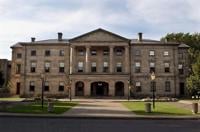MONTREAL - A Superior Court judge has denied a request from Montreal's Roman Catholic archdiocese for an exemption to a Quebec law requiring all palliative care centres in the province to provide medical assistance in dying.
Justice Catherine Piché ruled March 1 that Quebecers' right to choose their medical care — including a doctor-assisted death — outweighs any infringement of religious freedom.
The archbishop's office filed the court challenge to the law in early February and sought to have a church-supported palliative care home in Montreal — St. Raphael’s — immediately exempted from the requirement until the case goes to trial.
"When it comes to the right to chose medical care and to obtain access to medical assistance in dying, the public interest is fundamental,” Piché wrote in her ruling. "Despite the plaintiffs' significant interest in protecting their religious beliefs, this interest has less legal weight than the right of Quebecers to access the care of their choice, including medical assistance in dying, at St. Raphael’s home."
Archbishop Christian LĂ©pine argued that Quebec's end-of-life care law violates freedom of religion because it forces the church to perform a procedure on its property that it finds morally unacceptable. As well, he said, Catholic donors and volunteers helped create and sustain the centre because it respected their religious beliefs.
LĂ©pine told the court in a sworn statement that supporting access to free, quality palliative care is a way for him and the archdiocese to put their Catholic faith into practice, but not if the centre is forced to offer MAID.
"I hope that the archdiocese's involvement with St. Raphael’s will continue for a long time, but if (St. Raphael’s) remains forced to administer medical assistance in dying, I can't in good conscience continue to support the organization and encourage the faithful of the archdiocese to do so, because medical assistance in dying contradicts my sincere religious beliefs and my moral values," he said.
A 2019 agreement between St. Raphael’s and the government allowed patients who wanted MAID to be transferred to another facility for the procedure. The province argued that since the centre's patients already had the option for MAID, the archbishop's court challenge was "inconsistent" with that agreement.
Piché found, however, that the government's actions impacted the plaintiffs' ability to follow their religious beliefs and that it created a real intractable moral dilemma for Catholic supporters of the facility, who believe in caring for those who are dying but see the hastening of their deaths as a violation of the sacred and inviolable nature of human life.
While St. Raphael’s Palliative Care Home and Day Centre isn't a religious facility — and is open to anyone regardless of religious beliefs — it operates out of a former church that remains owned by the archdiocese. Under the terms of its lease with the archdiocese it has been forbidden from offering MAID.
Marco Ottoni, vice-president of the organization’s board, said in a sworn statement that St. Raphael’s would not have been opened without the “extensive” support of the Catholic church.
“While (St. Raphael’s) is not a religious organization and does not have a religious mandate, the board of directors has always worked to ensure that the palliative care home project reflected the values and orientations of the archdiocese. This includes respecting the Roman Catholic Church’s opposition to medical assistance in dying,” he said.
The archdiocese raised $10 million to launch the project, the judge wrote.
According to the judgment, no one staying at St. Raphael’s has requested MAID or received it at the facility; however, the organization's director, Olivia Lévêque, testified that some patients and their relatives had expressed concern that they might not be able to receive the procedure at the home if the court granted the exemption.
The broader constitutional challenge to the law will be heard at trial at a later date.
Sarah Bigras, a spokeswoman for Quebec's minister responsible for seniors, Sonia BĂ©langer, said the government was pleased with the decision.
"Asking people at the end of their life to go somewhere else to receive medical assistance in dying is not a practice that we want to see," she wrote in an email.
The archbishop's office did not respond to a request for comment Thursday.
This report by Ďă¸ŰÁůşĎ˛ĘąŇĹĆ×ĘÁĎ was first published March 7, 2024.








































